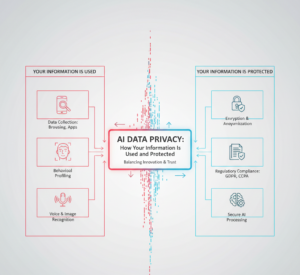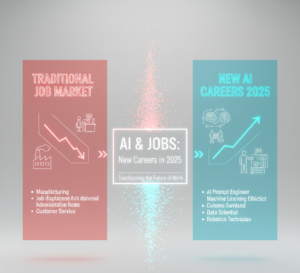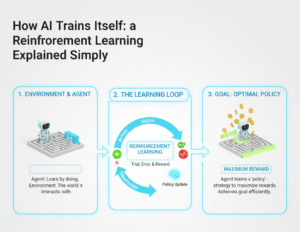The Role of Artificial Intelligence in the Smart Cities of the Future

The Role of Artificial Intelligence in the Smart Cities of the Future
The idea of a “smart city” has undergone a transformation from a future fantasy to a realistic approach to urban planning, which has been fueled by fast improvements in technology. Of all the technologies that are available, artificial intelligence (AI) is the one that is having the most significant impact. It is revolutionizing the way that cities operate, enhancing the quality of life, and making urban settings more sustainable, efficient, and responsive.
1. Gaining an Understanding of Smart Cities
Smart cities use digital technology and solutions that are driven by data in order to improve the infrastructure and services that are available in metropolitan areas. Artificial intelligence, which serves as the brain behind these systems, allows cities to analyze massive quantities of data from sensors, cameras, and connected devices in order to make choices in real time, foresee issues, and improve urban life.
2. The Use of Artificial Intelligence in Traffic Management
Urban regions are often plagued by the issue of traffic congestion. Artificial intelligence has the capability to examine traffic patterns in real time, dynamically alter traffic lights, and provide suggestions for the best possible routes in order to lessen congestion. Predictive analytics are capable of providing forecasts for peak traffic times, accidents, or bottlenecks. This information may assist city planners in the implementation of preemptive measures. In addition to reducing the amount of time that commuters spend traveling, this also results in a decrease in the pollution that is produced by cars that are left to idle.
3. Security and Safety of the Public
Surveillance systems that are driven by artificial intelligence have the ability to identify potential dangers, detect strange patterns of activity, and notify the authorities as soon as possible. Law enforcement agencies are able to react more effectively as a result of facial recognition, license plate analysis, and anomaly detection. Moreover, artificial intelligence (AI) has the ability to assess crime trends and provide guidance on preventative tactics, which would result in making cities safer while also taking privacy concerns into mind.
4. Optimization of Energy
Smart cities are able to intelligently regulate their energy use with the assistance of artificial intelligence. Smart grids, which are driven by artificial intelligence algorithms, have the ability to anticipate electricity consumption, incorporate renewable energy sources, and minimize waste. Buildings that have heating, ventilation, and air conditioning systems that are managed by artificial intelligence are able to optimize energy use based on occupancy and weather predictions, which results in cheaper expenses as well as smaller carbon footprints.
5. Environmental Monitoring in Addition to Waste Management
The use of sensors and analytics that are powered by artificial intelligence (AI) improves the collecting of garbage and the recycling process. When they are full, smart bins have the ability to send alerts to the authorities, and predictive algorithms are able to optimize collection routes. Artificial intelligence (AI) is also capable of monitoring air quality, water levels, and patterns of pollution. This allows cities to be able to react to environmental threats in a timely manner as well as prepare for steps that will ensure sustainability in the long run.
6. Smart Cities and the Healthcare Services They Provide
Predictive healthcare is made possible by artificial intelligence (AI), which allows for the prediction of prospective epidemics or groups that are at high risk based on trends in patient data. With telemedicine, diagnostics supported by artificial intelligence, and automated patient monitoring, accessibility and efficiency are both improved. Artificial intelligence (AI) is able to improve ambulance route and resource allocation in emergency situations, which helps to save lives.
7. Intelligent Public Transportation
Demand forecasting, route optimization, and the reduction of wait times are all ways in which artificial intelligence is being used to alter public transportation systems. The use of predictive maintenance for automobiles, ride-sharing platforms handled by artificial intelligence, and buses that operate without a driver are all ways to guarantee that urban transportation is more efficient, safer, and smoother.
8. Urban Planning and Development of Infrastructure
Artificial intelligence may be used by urban planners to model the expansion of cities, to anticipate the requirements for infrastructure, and to make the most of land usage. It is possible for artificial intelligence to estimate the effects that new projects will have on traffic, pollution, and social dynamics, which will enable planners to make educated choices that will improve the quality of life.
9. Citizen Participation and Governance
Citizens may have immediate access to government services and information via the use of chatbots and virtual assistants that are driven by artificial intelligence. Additionally, policy may be informed, service gaps can be identified, and responsiveness can be improved by using artificial intelligence to assess input from citizens, social media, and Internet of Things (IoT) devices. As a result, a governance model that is more transparent and participatory is encouraged.
10. Difficulties in the Integration of Artificial Intelligence
There are difficulties that arise with integrating artificial intelligence into smart cities. Because smart cities depend largely on personal and municipal data, data privacy and cybersecurity are significant problems for these urban centers. In addition, biases that influence the decision-making process might be present in artificial intelligence (AI) systems. In addition, the expense of implementation and technical inequalities might cause inequities to arise among the people living in the area.
11. The Vision for the Future
In the future, smart cities will be more autonomous, resilient, and human-centered as artificial intelligence continues to advance. Artificial intelligence (AI) will be the driving force behind the transformation of cities into places that are more sustainable, efficient, and conducive to a greater quality of life. This transformation will be achieved via a variety of means, including adaptable infrastructure, predictive healthcare, energy-neutral buildings, and responsive government. Over the course of the next years, artificial intelligence (AI) has the potential to allow cities to learn from their own experiences, which would lead to the ongoing optimization of urban ecosystems in ways that were beyond our wildest dreams in the past.
Artificial intelligence is more than just a convenient tool; it is the foundation upon which the urban lifestyle of the future will be built. Artificial intelligence (AI) turns cities into dynamic, adaptable ecosystems by intelligently managing resources, boosting public services, and allowing informed decision-making. Artificial intelligence (AI) will be essential in the construction of cities that are more intelligent, secure, and sustainable for centuries to come as urban populations continue to increase.




